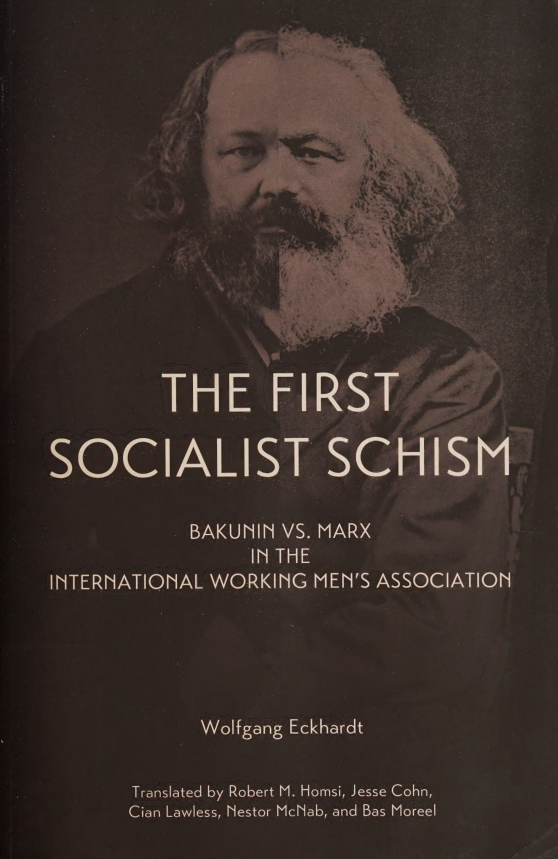Biblioteca / 2010-2019
Wolfgang Eckhardt. The First Socialist Schism. Bakunin vs. Marx in the International Working Men’s Association.
Oakland, CA: PM Press, 2016.
Traducciones: Robert Homsi, Jesse Cohn, Cian Lawless, Nestor McNab y Bas Moreel.
600 páginas.
The First Socialist Schism narra los conflictos de la Asociación Internacional de Trabajadores (Primera Internacional, 1864-1877), que representa un hito importante en la historia de las ideas políticas y la teoría socialista. Al defender su autonomía, las federaciones de la Internacional tomaron conciencia de lo que las separaba del movimiento socialdemócrata, que se apoyaba en la creación de partidos obreros nacionales y en la conquista del poder político. Esto puede considerarse un momento decisivo en la historia de las ideas políticas: la escisión entre la política centralista de partidos y el movimiento federalista de base. Los movimientos separados en la Internacional -que más tarde se convertirían en la socialdemocracia, el comunismo y el anarquismo- encontraron sus mayores defensores en Mijaíl Bakunin y Karl Marx. Sin embargo, la importancia de este supuesto choque de titanes es en gran medida una invención moderna. No fue la rivalidad entre dos enemigos o una venganza personal basada en el resentimiento mutuo lo que hizo que el conflicto entre Bakunin y Marx fuera tan importante. Lo que fue significativo fue que el conflicto anunció el primer cisma socialista entre la política de partido parlamentaria que aspiraba a conquistar el poder político y los conceptos social-revolucionarios. En lugar de centrarse exclusivamente en lo que dijeron Marx y Bakunin, se examinan muchas otras aportaciones a este debate, lo que hace de éste la primera reconstrucción de una disputa que atenazó a toda la organización. Este libro también proporciona el primer relato detallado del Congreso de La Haya de la Internacional (septiembre de 1872), incluyendo los antecedentes, la secuencia de los acontecimientos y la reacción internacional. El libro establece nuevas pautas en lo que se refiere a las fuentes, teniendo en cuenta documentos de numerosos archivos y bibliotecas que hasta ahora habían pasado desapercibidos o eran completamente desconocidos.
Contents
1 – Bakunin, Marx, and Johann Philipp Becker
The Alliance ‘request’ by Johann Philipp Becker (November 1868)
The Alliance joins the International (February—July 1869)
Becker’s position paper on the question of organisation (July 1869)
2 – The International in Geneva and in the Jura Region
The International in Jura (February—May 1869)
3 – The Basel Congress of the International
Bakunin’s manuscript ‘To the Citizen Editors of the Réveil’ (October 1869)
Bakunin’ first strategy: attack not Marx but his associates
4 – Marx’s ‘communications’ concerning Bakunin
Bakunin’s defence by Eugéne Hins (January 1870)
The ‘Confidential Communication’ to German social democrats (March 1870)
5 – The Romance Federation split
La Chaux-de-Fonds Congress (April 1870)
Marx’s third communication’ regarding Bakunin (April 1870)
The General Council’s decision (June 1870)
The international response and the International’s next congress (April—August 1870)
6 – Fixing the International’s course
Bakunin’s second strategy: cautious criticism of Marx
Paul Robin, the congress question, and the disbanding of the Geneva Alliance section (summer 1871)
Marx and pluralism within the International
7 – The London Conference
The London Conference’s decision on the Swiss conflict (resolutions nos. 16 and 17)
The Nechaev trial (resolution no. 14 of the London Conference)
Constitution of the working class into a political party (resolution no. 9 of the London Conference)
8 – The Sonvillier Circular
Reaction of the Belgian Federation of the International (November—December 1871)
Engels’ article about the Sonvillier Circular and the declarations in support of the London Conference from Saxony and Geneva
9- The International in Italy
Reaction of the International in Italy (until January 1872)
Engels’ letter to Theodor Cuno in Milan of 24 January 1872
Bakunin’s Italian manuscripts (end of 1871 to beginning of 1872)
10 – The International in Spain
The International in Madrid and the founding congress of the Spanish Federation in Barcelona (1869-1870)
Slow reaction of the Spanish International to the Sonvillier Circular (November 1871-early 1872)
Paul Lafargue goes to Spain
11 – Lafargue’s activities in Spain
Lafargue and the Emancipacion’s contact with the Republican Party (January to March 1872)
The Saragossa Congress (4—11 April 1872) and Lafargue’s reports in the Liberté
Bakunin’s letters to Mora and Lorenzo (April-May 1872)
12 – The Belgian rules project and the Fictitious Splits
Fictitious Splits in the International by Marx and Engels
Bakunin’s third strategy: open criticism of Marx
Debate over the Belgian rules project and the second Belgian federal congress (14 July 1872)
Cafiero’s reckoning with Engels (12-19 June 1872)
13 – Convening the Congress of The Hague
Boycott or participation?
14 – The factional divide in the Spanish International
The Alianza fracas
Engels’ attacks against the Alianza (July-August 1872)
The Spanish delegate elections and the New Madrid Federation before the Congress of The Hague
15 – The eve of the Congress of The Hague
The opposition
Delegate mandates from the United States and Germany
The French and General Council delegate mandates
16 – The Congress of The Hague: the mandate commission and the commission to investigate the Alliance
The verification of the mandates
The voting procedure and the commission to investigate the Alliance
The story behind Bakunin’ translation of Capital
17 – The revisions to the Rules, the transfer of the 331 General Council and the ‘Minority Declaration’
The debate concerning the transfer of the General Council and resolution no. 9 of the London Conference
Constitution of the minority and the final meeting of the Congress of The Hague
18 – The Congresses of St. Imier, Brussels, and Cordoba
The downfall of the Congress of The Hague’s majority
The Brussels Congress (December 1872)
The Cordoba Congress (December 1872)
Bakunin and the Congress of The Hague
19 – The Geneva Congresses and the disastrous New York General Council
Reactions in Belgium, Spain, and Italy
The split of the English International
The congress of the federations (1-6 September 1873)
The General Council’s congress (8—13 September 1873)
20 – Politics and historical narratives
The pamphlet ‘LAlliance’
The Mémoire of the Jura Federation
Epilogue
Bibliography
